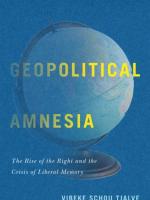The United Nations is a halfway-house between the national and the cosmopolitan
As the United Nations was gearing up to celebrate its 75th anniversary, Covid-19 laid bare a key paradox of our time: when confronted by problems that are inherently transnational, the political impulse is to look for national solutions.
Senior researcher Louise Riis Andersen explores why the political space that enables collective action at a global level is closing at a time when the reality of our interdependent human fragilities is growing. Her analysis suggests that the problem is not so much that the aging and state-centric UN is no longer “fit for purpose,” but rather that the defenders of multilateralism have forgotten the pragmatic realist roots of the world organization.
The power politics and clashes over interests and values that play out in the UN are intrinsic to the main function of the world organization: to enable peaceful resolution of conflicts. With its paradoxical mixture of sovereign equality, great power responsibility and knowledge-producing bureaucracy, the UN was not designed to ensure effective decision-making, but rather to facilitate negotiated, and thus by definition compromised, solutions.
The book chapter appears in Vibeke Schou Tjalve’s edited book ‘Geopolitical Amnesia. The Rise of the Right and the Crisis of Liberal Memory’ that was published by McGill Queens University Press in May 2020.

